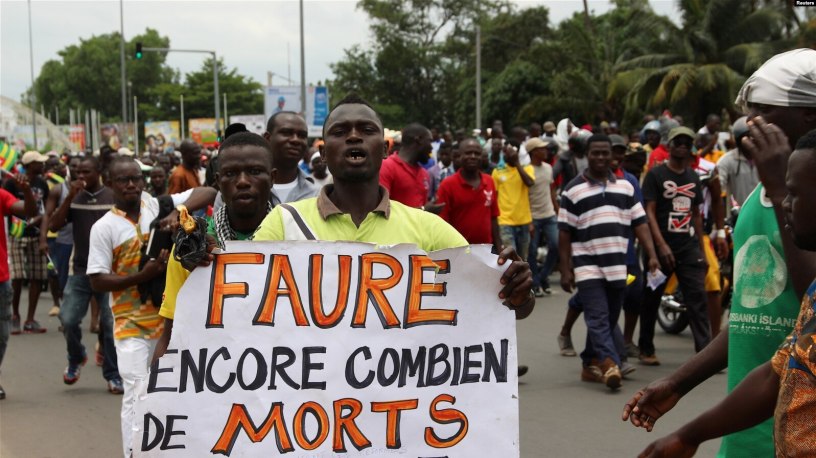In the past few years, we have observed the global democratic backsliding triggered by the rise of demagogy and populist terrorism. There is however little focus on Africa (see more here in 2021 and 2022); despite less populist impact, the grip of the continent’s many long-reigning despots tightened, and they became more confident when other countries fell one by one, emboldened by dictatorial superpowers in Russia and China and even the complicity of France.
The Republic of Togo is one of the cases of perpetual rule of dictatorship in Africa. Opposition to president Fauré Gnassingbe is existent before he took office in 2005. He is the son of Etienne Eyadéma, a Togolese military official who also had a long-lasting autocracy.
To give you a background, we’ll start with the campaign of the country’s first president for national independence. The German protectorate of Togoland was halved into two, with the west taken by the British and later becoming part of modern-day Ghana, and the east under the French. The Olympio family, which has influence on the region, was perceived by the Nazi-aligned Vichy France regime as pro-British, and Sylvanus, who was to be the first Togolese president, advocated for independence and sovereignty especially in the 1950s. In the book Men of the Century, the author, British journalist Russel Warren Howe, wrote about how France attempted to intervene in the region’s elections and how Sylvanus Olympio’s party defeated its power in 1958 to assert an independent Togolese policy.
Olympio wanted to retake Western Togoland from independent Ghana. When he and Ghanaian leader Kwame Nkrumah met to discuss the fate of the region, Nkrumah’s proposal was unification with Ghana, for which Olympio accused him of being a “black imperialist” and finding a need for armed forces. But Olympio, having angst over France, refused to increase the military manpower through assimilation of Togolese ex-French Army members, against the wishes of military leaders Emmanuel Bodjollé, Kléber Dadjo, and Eyadéma. Economic mismanagement and increased authoritarianism may have made Olympio unpopular, but the military feud had led to his ouster and death on 13 January 1963. Olympio critics Nicolas Grunitzky and Antoine Meatchi filled the power void in, but in 1967 Eyadéma instigated another coup and removed them, establishing a dynasty which portrayed him being a superhuman after surviving a plane crash in 1974 and thus changing his name to Gnassingbé Eyadéma.
Came the Revolutions of 1989 and the global transition to democracy, and Togo had its chance with Joseph Kokoh Koffigoh becoming prime minister in 1991 despite Eyadéma’s attempt to stop him. But the president resisted to lose power and in August 1993 won in the presidential election amidst boycott and protests from the opposition (Gilchrist Olympio, son of Sylvanus, was rejected by the regime as candidate, and Yawovi Agboyibo and Edem Kodjo withdrew their candidacies in response). Eyadéma had term limits removed in 2002 and managed to keep his position until his death on 05 February 2005.
Eyadéma’s utilities minister was his own son, Faure. He was declared by the armed forces chief Zakari Nandja as president, something akin to the succession of Chadian leadership from Idriss Déby to his son Mahamat in 2021 (except that the older Déby’s death was brutal), as both transitions to power are also denounced by the international community as coups. Faure Gnassingbé had to relinquish his post after 20 days, but it did not take long for him to return after the controversial 24 April elections, which ended up in mass protests and the subsequent bloody crackdown on the demonstrations that left at least 400 killed according to the United Nations and around 35 000 more in exile.
It is every election period that the situation in Togo becomes most turbulent, but whereas the previous polls were denounced as fraudulent by election observers, the later ones were seen as freer and fairer (see case of 2020 polls) despite internet shutdowns. But opposition forces still refused to immediately accept the outcomes, as Jean-Pierre Fabre did in challenging Gnassingbé in 2015, and Agbéyomé Kodjo in 2020.
The incumbent leader may still remain in office until 2030 after Parliament approval in 2019, and the next presidential election is next year. This year will only be legislative polls, but the same kind of tension is present. These are originally scheduled on the 20th of this month, but on 03 April the regime postponed these, prompting the Togolese opposition to call for protests today (11 April) until the 13th (Saturday). Right before the demonstrations, the polls are rescheduled to 29 April, similar to what happened in Senegal earlier this year. But it might be unlikely that Gnassingbé will redo a Macky Sall who no longer planned to run for presidency again, since the Togolese leader has not shown intentions to loosen up. His regime has also banned the planned demonstrations, a move meaning he’s not willing to give concessions.
But since every election is marred and followed by protests, dissent and violent response thereto, critics of the Gnassingbé regime cannot take this any longer. Thousands had fled in 2005, and many remained abroad. It’s an issue outside the spotlight, and Togo is still under dynastic rule. It took extensive international media coverage in Senegal, especially when its opposition figures like Ousmane Sonko and now-president Bassirou Diomaye Faye were arrested, for the country and its democracy movement to be noticed.
The victory of Faye last month marked one reversal in the global democratic backsliding, although whether he will shift Senegalese ties from France to Russia and PR China remains as a question. I hope this time the Togolese democracy movement gains momentum, mobilises the masses, catches the attention of the international community to help in the country’s democratic crisis, and become another inspiration for people inside and outside Africa to value their voices and fight for freedom.
Article posted on 11 April 2024, 16:28 (UTC +08:00).
